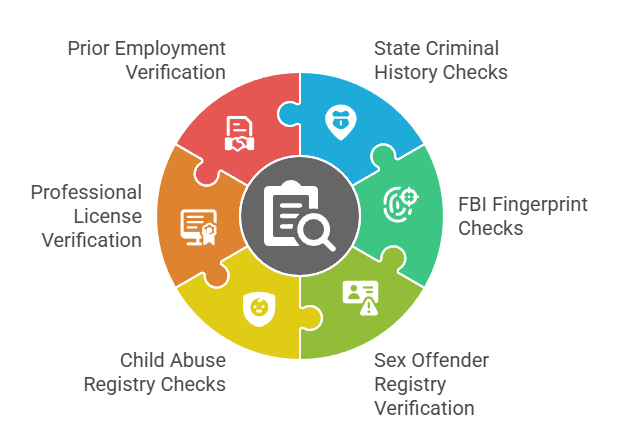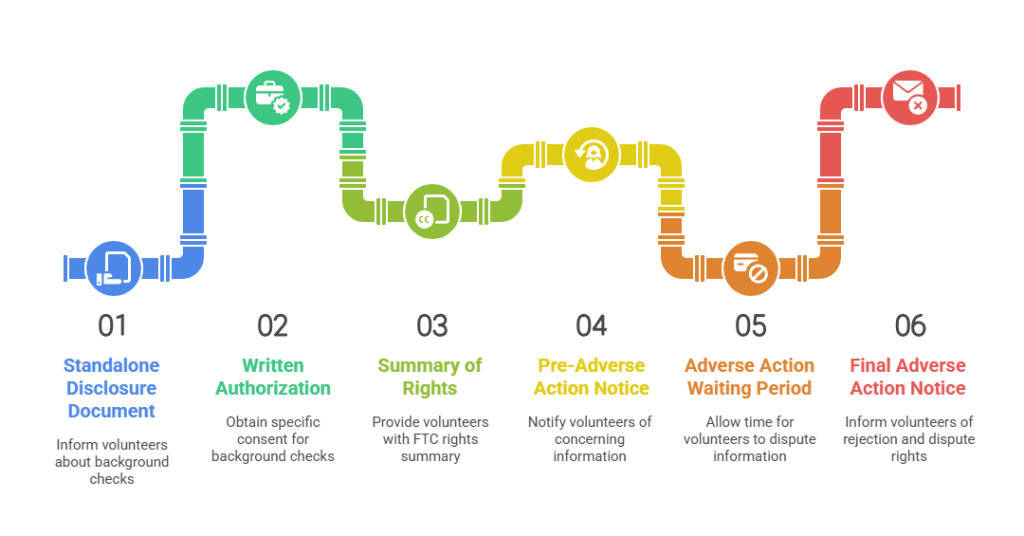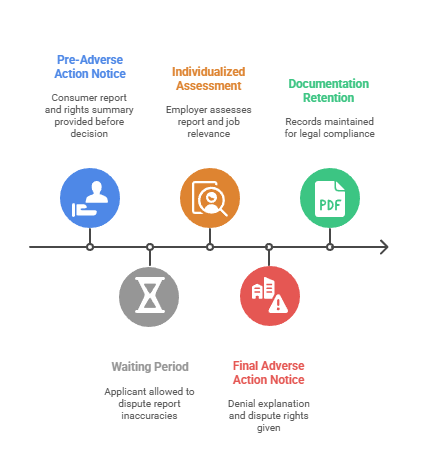Educational institutions and childcare facilities face unique FCRA compliance challenges when conducting background checks on employees and volunteers who work with vulnerable populations. This comprehensive guide addresses the intersection of federal Fair Credit Reporting Act requirements, state education codes, FBI background check protocols, and sector-specific screening obligations that HR administrators and compliance officers must navigate to maintain legal compliance while protecting children.
Key Takeaways
- Educational institutions must comply with both FCRA federal requirements and state-specific education codes that often impose stricter background check standards than federal law mandates.
- The FCRA's adverse action process requires specific disclosure, authorization, and notification procedures before denying employment based on background check findings in education settings.
- Childcare facilities face additional licensing requirements including fingerprint-based FBI background checks and state child abuse registry searches beyond standard FCRA screening.
- Volunteer screening programs must follow identical FCRA compliance protocols as employee screening, including proper disclosure and authorization procedures.
- Pre-adverse and adverse action notices must provide applicants 5-7 business days to dispute inaccurate information before finalizing employment decisions.
- Educational institutions using third-party Consumer Reporting Agencies must provide standalone disclosure documents separate from employment applications.
- State education codes in most jurisdictions require continuous monitoring and periodic re-screening of existing employees, not just pre-employment checks.
- Documentation retention policies must balance FCRA requirements with state education records laws, typically maintaining screening records for 3-7 years post-employment.
Understanding FCRA Requirements in Educational Settings
The Fair Credit Reporting Act establishes federal standards for background checks across all industries. However, education sector organizations face additional complexities due to their responsibility for child safety. Educational institutions function simultaneously as employers subject to FCRA regulations and as guardians of vulnerable populations requiring enhanced screening protocols. Understanding how FCRA compliance intersects with education-specific requirements creates the foundation for legally defensible hiring practices.
Core FCRA Obligations for Education Employers
Educational organizations conducting background checks through Consumer Reporting Agencies must fulfill specific FCRA requirements before, during, and after the screening process. The disclosure requirement mandates that institutions provide applicants with a standalone document informing them that a background check will be conducted. This document cannot be buried within employment applications or employee handbooks. Authorization must be obtained through a separate signature, and the disclosure document cannot contain liability waivers or other extraneous information that could confuse or mislead applicants.
Before taking adverse action based on background check results, education employers must provide pre-adverse action notices. These notices include a copy of the consumer report and the FTC's "Summary of Your Rights Under the FCRA." Applicants must receive reasonable time, typically 5-7 business days, to review the information and dispute any inaccuracies. After the waiting period, if the institution proceeds with the adverse decision, a final adverse action notice must be sent. This notice identifies the Consumer Reporting Agency, clarifies that the CRA didn't make the employment decision, and informs the applicant of their right to dispute the report's accuracy within 60 days.
Education-Specific Modifications to Standard FCRA Processes
Teacher background check processes incorporate additional elements beyond standard employment screening due to state education codes and Department of Education requirements. Most states require fingerprint-based background checks processed through state identification bureaus and the FBI's Criminal Justice Information Services division. This creates a dual-layer screening approach that combines FCRA-regulated commercial background checks with government-mandated criminal history searches. These FBI background checks access records not available through standard commercial databases, including sealed or expunged records in certain jurisdictions.
School district hiring compliance programs must reconcile FCRA timelines with education sector hiring cycles. The compressed timeframe between job offers and school year start dates creates pressure to expedite background checks. However, FCRA adverse action waiting periods cannot be shortened regardless of operational needs. Education HR departments increasingly implement continuous screening programs that begin background checks earlier in the recruitment process while maintaining FCRA-compliant authorization and disclosure protocols at each stage.
Consumer Reporting Agency Selection for Education Sector
Selecting appropriate Consumer Reporting Agencies for education background check compliance requires evaluating vendors' understanding of both FCRA requirements and education sector-specific needs. CRAs serving educational institutions should demonstrate expertise in coordinating fingerprint-based FBI checks with commercial database searches. They should also access state child abuse and neglect registries while navigating varying requirements across different state education departments. The agency should provide FCRA-compliant disclosure and authorization forms pre-customized for education sector usage.
Education organizations should verify that their CRA maintains appropriate certifications and follows reasonable procedures to ensure maximum possible accuracy. This requirement comes from FCRA Section 607(b). The agency should have established dispute resolution processes that allow applicants to challenge inaccurate information. Additionally, CRAs should provide adverse action letter templates specific to education sector compliance needs. They should also offer guidance on state-specific requirements that exceed federal FCRA standards.
Childcare FCRA Requirements and Licensing Compliance
Daycare employee screening requirements typically exceed standard FCRA processes by requiring multiple types of background checks. These include mandatory disqualifying offenses lists and periodic re-screening intervals. Childcare facilities must maintain documentation proving compliance with both FCRA federal standards and state-specific childcare licensing requirements. This documentation is necessary to retain their operating licenses. These facilities operate under the most stringent background check requirements in the education sector due to state licensing regulations and enhanced screening protocols.
Multi-Layered Screening Requirements for Childcare Staff
Daycare employee screening requirements incorporate several distinct background check components. Each component must be coordinated while maintaining FCRA compliance. State and federal criminal history checks form the foundation, typically requiring fingerprint-based FBI background checks that access the National Crime Information Center database. Sex offender registry searches across all states where the applicant has lived provide another mandatory layer. Child abuse and neglect registry checks access state-maintained databases of substantiated abuse allegations.
| Background Check Component | FCRA Applicability | Typical Turnaround Time |
| FBI Fingerprint Check | Partial (government-conducted) | 3-5 business days |
| Commercial Criminal Database | Full FCRA compliance required | 1-3 business days |
| Sex Offender Registry | FCRA disclosure required | 1-2 business days |
| Child Abuse Registry | State-specific requirements | 5-10 business days |
| Employment Verification | Full FCRA compliance required | 3-7 business days |
Childcare centers must obtain separate FCRA authorizations for each background check component sourced through Consumer Reporting Agencies. They must also coordinate with government-conducted elements like FBI fingerprint checks. The comprehensive screening process typically requires 2-3 weeks for completion. Most states prohibit childcare workers from having unsupervised contact with children until all background check components return clear results. This creates operational challenges for facilities needing to maintain staffing ratios but cannot legally deploy new hires until screening completes.
State Licensing Requirements Versus FCRA Standards
State childcare licensing agencies impose background check requirements that frequently exceed FCRA minimums. This creates compliance obligations that education sector employers must navigate simultaneously. Many states mandate specific disqualifying offenses lists that automatically prohibit employment for individuals with certain criminal convictions. This applies regardless of how long ago the offense occurred or evidence of rehabilitation. While FCRA requires individualized assessments considering the nature of the offense, time elapsed, and job duties before making adverse employment decisions, state licensing laws may mandate automatic disqualification.
This tension between FCRA's individualized assessment requirement and state automatic disqualification rules requires careful navigation. Legal precedent generally holds that state licensing requirements supersede FCRA when the state law specifically addresses childcare facility employment eligibility. However, childcare facilities must still follow FCRA procedures when the background check is conducted through a Consumer Reporting Agency. This means applicants receive disclosure, authorization forms, and adverse action notices even when state law mandates disqualification. The adverse action letter should specify that the decision stems from state licensing requirements rather than the employer's discretionary judgment.
Volunteer and Contractor Screening in Childcare Settings
Childcare licensing background checks extend beyond direct employees to include volunteers, substitute staff, and contractors who may have contact with children. FCRA compliance applies equally to volunteer screening as to employee screening when background checks are conducted through Consumer Reporting Agencies. Facilities must provide volunteers with the same disclosure documents, obtain written authorization, and follow adverse action procedures if background check results would disqualify someone from volunteering.
Many childcare centers mistakenly believe simplified procedures apply to volunteer screening. They also incorrectly think that FCRA requirements don't apply to unpaid positions. This misconception creates significant compliance risks, as FCRA makes no distinction between screening for paid versus unpaid positions. Volunteer screening programs should mirror employee screening protocols, including the same multi-layered background check components. They should use identical disclosure and authorization documents and equivalent adverse action procedures. Contractors and vendors whose employees will have contact with children typically must undergo the same background screening. The childcare facility either conducts checks directly or requires the contracting company to provide documentation of equivalent screening completed.
State Education Codes and Federal FCRA Coordination
Education sector background verification must reconcile federal FCRA requirements with state education codes that vary significantly across jurisdictions. Most states have enacted education-specific background check laws that supplement FCRA requirements with additional screening elements. These laws include stricter disqualification standards and mandatory re-screening intervals. Understanding how these state requirements interact with federal FCRA compliance creates a complex regulatory landscape that education administrators must navigate.
State-Mandated Background Check Components
State education codes typically specify particular background check elements that school districts and private schools must complete beyond standard FCRA-regulated employment screening. Each state education code specifies which components are mandatory for different position types. Direct classroom teachers typically require the most comprehensive screening while support staff may have reduced requirements.
These mandatory components commonly include:

- State criminal history repository checks: Direct searches of state law enforcement databases administered by state police or identification bureaus
- FBI fingerprint-based background checks: Searches of the National Crime Information Center and Interstate Identification Index databases
- Sex offender registry verification: Multi-state registry searches covering all jurisdictions where the applicant has resided
- Child abuse registry checks: Searches of state-maintained databases listing individuals with substantiated child abuse or neglect allegations
- Professional license verification: Confirmation that teaching certificates and credentials remain valid without disciplinary actions
- Prior employment verification: Contact with previous education employers to identify any disciplinary actions or terminations related to misconduct
FCRA compliance applies to those screening elements conducted through Consumer Reporting Agencies, requiring appropriate disclosure, authorization, and adverse action procedures for each component. Government-conducted elements like FBI fingerprint checks fall partially outside FCRA's scope but still require disclosure to applicants as part of transparent hiring practices.
Reconciling State Timelines with FCRA Waiting Periods
School district hiring compliance faces unique challenges when state education codes mandate specific background check completion timelines. These may conflict with FCRA adverse action waiting periods. Some states require that all background check components be completed and cleared before an individual can begin employment or have contact with students. Meanwhile, FCRA requires applicants 5-7 business days to dispute adverse information before finalizing employment decisions. This creates timing conflicts when background checks reveal concerning information near the intended start date.
Education institutions should structure their hiring timelines to accommodate both state education code requirements and FCRA waiting periods. They should initiate background checks as early as possible in the recruitment process. Conditional offer letters should clearly specify that employment is contingent upon successful completion of all required background checks. The letters should note that the start date may be delayed if additional review becomes necessary. When adverse information arises, institutions must honor FCRA waiting periods even if this causes delays in meeting state compliance deadlines. Federal FCRA requirements supersede operational preferences.
FBI Background Checks and Fingerprint Processing in Education
FBI background checks represent a critical component of education background check compliance. They operate partially outside the Consumer Reporting Agency framework while still requiring coordination with FCRA processes. These fingerprint-based background checks access criminal history information maintained by the FBI's Criminal Justice Information Services division. This includes arrest records, convictions, and certain sealed or expunged records not available through commercial databases. Educational institutions must understand how FBI background check procedures interact with FCRA-regulated screening conducted through Consumer Reporting Agencies.
FBI Background Check Process Flow
The teacher background check process incorporating FBI fingerprinting follows a specific workflow that differs from commercial background screening. Applicants must visit approved fingerprinting locations to have their fingerprints captured electronically or via traditional ink cards. These locations often include state identification bureaus, law enforcement agencies, or contracted fingerprinting services. These fingerprints are submitted to the state identification bureau, which conducts a state criminal history check. The bureau then forwards the fingerprints to the FBI for national criminal history review.
| Process Stage | Responsible Party | Typical Timeline | FCRA Applicability |
| Fingerprint Capture | Approved vendor or law enforcement | Same day | Disclosure required |
| State Criminal History Check | State identification bureau | 1-3 business days | Government process (FCRA exempt) |
| FBI Database Search | FBI CJIS Division | 24-72 hours | Government process (FCRA exempt) |
| Results Transmission | State bureau to employer | 1-2 business days | FCRA applies to use of results |
| Employer Review | Education institution | Variable | Full FCRA compliance required |
While the government-conducted portions of FBI background checks fall outside FCRA's definition of Consumer Reporting Agency activity, education employers must still provide disclosure to applicants. They must inform applicants that FBI fingerprint checks will be conducted and obtain authorization before submitting fingerprints. If FBI results reveal criminal history that leads to adverse employment action, FCRA's adverse action procedures apply. This applies to the extent the employer used information from the FBI report to make the employment decision.
Interpreting FBI Background Check Results
FBI background check results often require careful interpretation due to incomplete disposition information, outdated records, and arrest data without corresponding conviction details. FBI reports may show arrest records where charges were ultimately dismissed. They may also show convictions that have been expunged or sealed under state law. Some reports include criminal history from decades earlier with no subsequent offenses. Education employers must conduct individualized assessments considering the nature of the offense, time elapsed since the incident, the age of the individual at the time of the offense, and evidence of rehabilitation.
FCRA Section 605 restricts the reporting of certain criminal records based on age. However, these restrictions typically don't apply to government-conducted FBI background checks. Many state education codes provide similar protections, prohibiting education employers from considering arrests that didn't result in conviction. They may also restrict consideration of convictions beyond a certain age unless they involve specific serious offenses. When FBI results reveal criminal history, employers should verify the information directly with the originating court before taking adverse action. FBI records may be incomplete or inaccurate. This verification process protects both the applicant's rights and the employer's legal liability while ensuring decisions are based on accurate, complete information.
Volunteer Screening Compliance Under FCRA
The FCRA makes no distinction between employment screening and volunteer screening when background checks are obtained through Consumer Reporting Agencies. Institutions must provide volunteers with standalone disclosure documents and obtain written authorization separate from volunteer applications. They must follow complete adverse action procedures if background check results lead to rejecting a volunteer applicant. The same maximum possible accuracy standards apply, requiring institutions to use reputable Consumer Reporting Agencies. Volunteers must be allowed to dispute inaccurate information before being prohibited from volunteering.
Structuring Compliant Volunteer Background Check Programs
Volunteer background check programs should establish clear policies defining which volunteer roles require background screening. This determination is based on the level of student contact and supervision involved. Most education institutions implement tiered volunteer screening that requires comprehensive background checks for volunteers with unsupervised student contact. This includes classroom volunteers, field trip chaperones, and one-on-one tutors.
Documentation for volunteer screening should mirror employee screening compliance requirements and include:

- Standalone disclosure document: Separate form informing volunteers that background checks will be conducted through a Consumer Reporting Agency
- Written authorization: Signature specifically authorizing the background check, separate from general volunteer applications
- Summary of Rights: Copy of the FTC's "Summary of Your Rights Under the FCRA" provided with disclosure
- Pre-adverse action notice: Copy of the report and FTC rights summary if concerning information appears
- Adverse action waiting period: Allow 5-7 business days for the volunteer to dispute inaccurate information
- Final adverse action notice: Notice identifying the CRA and dispute rights if proceeding with rejection
Schools should establish volunteer background check policies that specify the scope of checks conducted, re-screening intervals, and procedures for addressing adverse findings. These policies should be applied consistently across all volunteer applicants to avoid discrimination claims while maintaining flexibility for individualized assessments when concerning information arises.
Managing Volunteer Screening Costs and Logistics
The cost of volunteer background screening creates budgetary challenges for education institutions that depend on volunteer involvement. They must conduct comprehensive background checks for FCRA and state education code compliance. Some institutions require volunteers to pay for their own background checks, which is legally permissible under FCRA as long as the cost is disclosed upfront. However, requiring volunteers to pay for background checks may discourage volunteer participation. This is particularly true among economically disadvantaged families whose involvement schools particularly value.
Education organizations increasingly negotiate volume pricing with Consumer Reporting Agencies to reduce per-check costs for volunteer screening. Some allocate budget specifically for volunteer background checks as part of safety program expenses. Some districts implement tiered cost-sharing where the institution pays for basic background checks. Volunteers requiring more extensive screening, such as overnight trip chaperones, pay additional costs. Grant funding and parent-teacher organization fundraising sometimes support volunteer screening programs to eliminate cost as a barrier to participation. Regardless of payment arrangements, the institution remains responsible for FCRA compliance and cannot delegate this responsibility to the volunteer or payment processor.
Adverse Action Procedures in Education Hiring
Before taking adverse action based on background check results, education employers must provide pre-adverse action notices. These notices include a copy of the consumer report and the FTC's "Summary of Your Rights Under the FCRA." This notice initiates a mandatory waiting period, typically 5-7 business days, during which the applicant can review the report. Applicants can identify inaccuracies and submit disputes to the Consumer Reporting Agency. The waiting period cannot be shortened regardless of operational needs or hiring timeline pressures. FCRA establishes minimum procedural protections that supersede employer preferences.
Pre-Adverse Action Notice Requirements
Pre-adverse action notices in education sector hiring must provide applicants with sufficient information and time to understand the basis for potential employment denial. The notices must allow applicants to exercise their dispute rights. The notice must include a complete copy of the consumer report that contains the adverse information. Institutions cannot provide only the problematic sections while withholding other report components. The FTC's "Summary of Your Rights Under the FCRA" must accompany the consumer report. This informs applicants of their right to dispute inaccurate information, obtain additional free reports, and seek damages for FCRA violations.
Education employers should provide pre-adverse action notices via methods that create delivery verification. Options include certified mail with return receipt or email with read receipt. This documents that applicants received the required information and the waiting period began. The notice should clearly explain that the institution is considering adverse action based on the background check report but has not made a final decision. It should state that the applicant has the opportunity to dispute inaccurate information before a final determination. Some education institutions include information about their individualized assessment process. They invite applicants to submit additional context about criminal history or other adverse information that appears in the background check.
Individualized Assessment and Final Adverse Action
After the mandatory waiting period expires, education employers proceeding with adverse action must conduct individualized assessments. These assessments consider the nature and severity of the offense, the time elapsed since the incident, and the relationship between the offense and the job responsibilities. The EEOC's guidance on criminal records use in employment decisions emphasizes that blanket exclusions based on criminal history categories may create disparate impact discrimination. This requires employers to evaluate each applicant's circumstances individually.
Final adverse action notices must be sent to applicants if the institution proceeds with employment denial after the waiting period and individualized assessment. The complete adverse action process includes the following stages:

- Pre-Adverse Action Notice: Copy of consumer report plus FTC Rights Summary provided before adverse action decision
- Waiting Period: Allow applicant time to dispute inaccuracies for 5-7 business days minimum
- Individualized Assessment: Consider nature, time, and job relationship after waiting period
- Final Adverse Action Notice: CRA contact info, dispute rights, and explanation if proceeding with denial
- Documentation Retention: All notices, reports, and decision rationale maintained for 3-7 years per state law
Education institutions should document their individualized assessment process thoroughly. This includes factors considered, mitigating circumstances evaluated, and specific reasons why the adverse information is relevant to the position. This documentation protects against discrimination claims and provides evidence of FCRA compliance if applicants challenge the adverse action.
Ongoing Compliance and Continuous Monitoring

Education sector background verification increasingly extends beyond pre-employment screening to include continuous monitoring of existing employees. It also includes periodic re-screening mandated by state education codes. Many states require teachers and childcare workers to undergo background checks at regular intervals, typically every 3-5 years. Some mandate continuous monitoring that alerts employers when employees are arrested or convicted of new offenses. These ongoing compliance requirements create additional FCRA obligations that education HR departments must manage systematically.
Re-Screening Existing Employees Under FCRA
State education codes in most jurisdictions require periodic re-screening of existing employees. Requirements vary from every year to every five years depending on the state and position type. These re-screening requirements necessitate obtaining fresh FCRA authorizations from existing employees. Initial pre-employment authorizations typically don't provide indefinite consent for future background checks. Education employers should implement systematic processes for obtaining re-screening authorization before conducting new background checks on current employees.
Re-screening authorization forms should follow the same FCRA disclosure requirements as initial employment screening. This includes standalone disclosure documents that aren't embedded in other paperwork. However, adverse action procedures differ somewhat for current employees versus applicants. Employment law protections apply when considering termination of existing employees based on new criminal history revealed through re-screening. Education institutions should consult employment attorneys when re-screening reveals new adverse information about current employees. Termination decisions must consider FCRA requirements, employment discrimination law, collective bargaining agreements, and state education employment law simultaneously.
Continuous Monitoring Program Compliance
Continuous monitoring services offered by Consumer Reporting Agencies provide real-time or periodic updates when monitored employees are arrested, convicted, or added to sex offender registries. These programs offer operational advantages for education sector employers responsible for large staff populations across multiple locations. However, they create specific FCRA compliance obligations. Employees must be informed clearly that they are being continuously monitored and authorize this ongoing surveillance. They must understand that criminal justice system involvement will be reported to their employer automatically.
When continuous monitoring alerts notify employers of new criminal activity, the employer must conduct individualized assessments before taking adverse employment action. These assessments consider the nature of the new offense, the circumstances surrounding it, and the employee's position and work history. Pre-adverse action procedures apply even to existing employees. This requires provision of the monitoring report and FTC rights summary before termination decisions. Some states provide greater employment protections for arrests without conviction. They require employers to provide employees opportunities to explain circumstances before taking adverse action. Education institutions should establish clear policies defining what types of monitoring alerts trigger mandatory action versus further investigation and individualized assessment.
Conclusion
FCRA compliance for education and childcare requires coordinating federal Fair Credit Reporting Act requirements with state education codes, FBI background check protocols, and sector-specific screening obligations that protect vulnerable populations. Educational institutions must implement systematic compliance processes encompassing proper disclosure and authorization procedures, multi-layered background check components addressing both commercial databases and government-maintained records, individualized adverse action procedures that provide applicants due process rights, and ongoing monitoring programs for existing employees. By understanding these complex intersecting requirements and establishing comprehensive compliance programs, education sector organizations can maintain legally defensible hiring practices while fulfilling their fundamental responsibility to protect children. The investment in proper FCRA compliance protects institutions from regulatory penalties and litigation while ensuring that screening programs effectively identify risks without unfairly excluding qualified candidates based on inaccurate information or overly broad disqualification criteria.
Frequently Asked Questions
Does FCRA apply to volunteer background checks in schools?
Yes, FCRA fully applies to volunteer background checks when schools use Consumer Reporting Agencies to conduct screening. Schools must provide volunteers with standalone disclosure documents, obtain written authorization separate from volunteer applications, and follow complete adverse action procedures if background check results lead to rejecting volunteer applicants. The same maximum possible accuracy standards and dispute rights apply to volunteer screening as to employee screening.
What is the difference between FBI background checks and commercial background checks for teachers?
FBI background checks are fingerprint-based searches of criminal history maintained in federal and state law enforcement databases, including the National Crime Information Center, and may include sealed or expunged records not available commercially. Commercial background checks search public records databases, court records, and various other sources compiled by Consumer Reporting Agencies. Most states require both types of screening for teachers, with FBI checks accessing law enforcement records while commercial checks provide broader searches of addresses, employment history, and professional licenses.
How long must schools wait before taking adverse action based on background check results?
Schools must provide applicants with pre-adverse action notices including a copy of the consumer report and allow a reasonable waiting period for applicants to dispute inaccurate information before finalizing adverse employment decisions. Best practice establishes 5-7 business days as the minimum waiting period, though FCRA doesn't specify an exact timeframe. This waiting period cannot be shortened regardless of hiring timeline pressures or operational needs.
Are childcare centers required to run background checks on parents who volunteer occasionally?
State childcare licensing requirements vary, but most states distinguish between regular volunteers who have unsupervised contact with children, who require comprehensive background checks, and occasional parent volunteers who participate in supervised activities with multiple adults present, who may require reduced screening or no background checks. Childcare centers should consult their state licensing regulations to determine specific requirements for different volunteer roles. When background checks are required and conducted through Consumer Reporting Agencies, full FCRA compliance applies.
Can schools use arrest records without conviction when making hiring decisions?
FCRA allows reporting of arrests without conviction for seven years, but the EEOC's guidance emphasizes that arrests without conviction have limited predictive value for employment decisions and may create discriminatory impact. Many state education codes prohibit considering arrests without conviction or require individualized assessments that consider whether the arrest led to dismissal of charges, time elapsed, and relevance to the position. Schools should establish policies that focus primarily on convictions while treating arrest-only records with caution.
What background checks are required for substitute teachers?
Most state education codes require substitute teachers to undergo the same background check components as full-time teachers, including FBI fingerprint-based criminal history checks, state criminal database searches, sex offender registry verification, and child abuse registry checks. Some states allow school districts to conduct modified screening for substitute teachers who work infrequently, but comprehensive background checks remain the standard practice. FCRA compliance requirements apply equally to substitute teacher screening.
How often must existing teachers be re-screened?
Re-screening intervals vary significantly by state, with requirements ranging from annual re-screening to five-year intervals, while some states require re-screening only when teachers change districts or positions. Education institutions should consult their specific state education code requirements to determine mandatory re-screening intervals. Each re-screening event requires obtaining fresh FCRA authorization from existing employees, as initial pre-employment authorization doesn't provide indefinite consent for future background checks.
Are private schools subject to the same background check requirements as public schools?
Private schools conducting background checks through Consumer Reporting Agencies must comply with federal FCRA requirements identical to public schools. State education code requirements often differ between public and private schools, with some states imposing comprehensive background check mandates on both sectors while other states regulate only public school employment screening. Private schools should verify both FCRA federal requirements and their specific state's private education employment screening regulations to ensure comprehensive compliance.
Additional Resources
- FCRA Section 607: Compliance, Permissible Purposes, and Consumer Rights
https://www.consumerfinance.gov/compliance/supervision-examinations/fcra/ - EEOC Guidance on the Consideration of Arrest and Conviction Records in Employment Decisions
https://www.eeoc.gov/laws/guidance/arrest_conviction.cfm - U.S. Department of Education: Background Checks for School Employees
https://www2.ed.gov/policy/landing.jhtml - FBI Criminal Justice Information Services: Background Check Resources
https://www.fbi.gov/services/cjis - FTC Summary of Your Rights Under the Fair Credit Reporting Act
https://www.consumer.ftc.gov/articles/pdf-0096-fair-credit-reporting-act.pdf
Still have questions?
Get in touch with our team today for a personalized demo and discover how our tailored volume pricing and packages can drive results for your business!
How useful was this page?*
Note: your comments are anonymous. We use them to improve the website. Do not include any personal details.
Visit our FCRA Compliance Tool or leave a message here if you need a response.
From the blog Explore the GCheck Content Hub

How Long Does a Background Check Take? A Complete 2025 Guide
13 Dec, 2023 • 14 min read
The Ultimate Background Check Guide
13 Dec, 2023 • 4 min read
The Ultimate Guide to Employment Background Checks
13 Dec, 2023 • 10 min readThe information provided in this article is for general informational and educational purposes only and should not be construed as legal advice or a substitute for consultation with qualified legal counsel. While we strive to ensure accuracy, employment screening laws and regulations—including but not limited to the Fair Credit Reporting Act (FCRA), Equal Employment Opportunity Commission (EEOC) guidelines, state and local ban-the-box laws, industry-specific requirements, and other applicable federal, state, and local statutes—are subject to frequent changes, varying interpretations, and jurisdiction-specific applications that may affect their implementation in your organization. Employers and screening decision-makers are solely responsible for ensuring their background check policies, procedures, and practices comply with all applicable laws and regulations relevant to their specific industry, location, and circumstances. We strongly recommend consulting with qualified employment law attorneys and compliance professionals before making hiring, tenant screening, or other decisions based on background check information.

